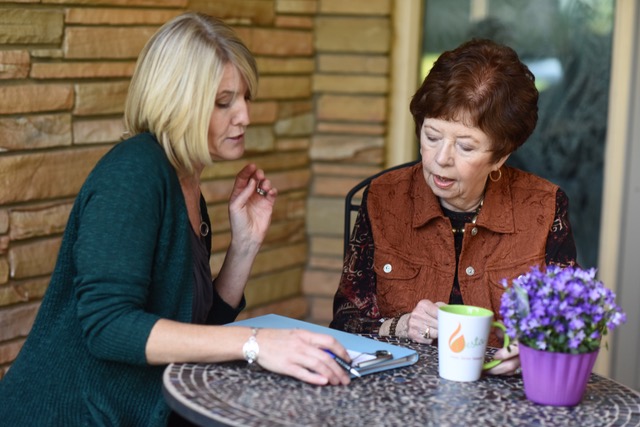She was far away, frightened and alone. In the space of a week, my mom had accepted an offer on her condominium in North Carolina and been diagnosed with Stage 4 bladder cancer. I needed to make some decisions – quickly. I informed the school district I would complete the week but then needed to attend to a family emergency. Within days I had left my husband and two sons behind, flying to North Carolina for what I thought would be a few days, a week at the most, to help my Mom pack up. The plan was to move her north, near me, where she would live in an independent living apartment and receive cancer treatment. One week turned into three as Mom traveled into and out of the local hospital with complications from the biopsy.
What is the Sandwich Generation?
This is my Mom’s story, but it is mine, too. I am a part of what many refer to as “the Sandwich Generation.” Who are we? We are the lifeblood of three generations and the glue often holding everything together at two ends, that of our children and our parents. We are sometimes younger, in our thirties and forties, but more frequently a bit older, in our fifties and sixties as medical treatments advance and our parents live longer.

Members of the Sandwich Generation are concerned with homecoming and college visits as well as an elderly parent’s latest fall or an upcoming surgery.
Nearly half (47%) of adults in their 40s and 50s have a parent age 65 or older and are either raising a young child or financially supporting a grown child (age 18 or older). And about one in seven middle-aged adults (15%) is providing financial support to both an aging parent and a child (Pew Research center, 2013).
At home, my husband was stretched to the limit, see-sawing between his job at work and responsibilities at home. We relied on friends and neighbors for help with carpools and some meals. The next year and a half would prove challenging in many ways as my Mom battled cancer and Parkinson’s disease, the cancer leading to her death in 2016. However, this initial month was the most acute for our family. Our situation was complicated by the fact that Mom lived in another state. With families commonly moving away from their place of origin, caring for one’s parents often turns into a bewildering crisis.

Caring for an elderly loved one can consume a lot of an employee’s work day. Seventy percent of working caregivers suffer work-related difficulties due to their dual roles.
Caregiver Crisis
Many families face a complication of a different sort. A majority of households in the U.S. are either dual income or single parent. Walking away from a job has permanent impacts. For some, it is simply not an option. Consider the example, provided by Fidelity Investments, of Laura, a caregiver who chose to leave her job to care for her mother. “Laura left a $70,000+ a year job to care for her mother for three years. The cost to her: $287,000 in lost salary, $63,000 in lost Social Security benefits, not to mention any loss in retirement dollars” (Fidelity, 2019). So often, the individual who has a parent or other loved one needing care is at a level in her career where she is a key contributor at her company and is in a position and earning a salary that is not easily replaced – by her or her employer.
I was fortunate in this regard. I could walk away from my work and return to it on a part-time basis when ready. My work was flexible and at the same time, because my husband was the primary breadwinner, our family finances did not take a big hit. I knew at the time that though we were struggling, things would have become really untenable had mine been a full-time job that I could not financially leave.
Working Caregivers
One in six workers is assisting with the care of an elderly family member or friend. This responsibility puts stress not only on a family but also on the economy. As they try to navigate two jobs at once, 70% of working caregivers suffer work-related difficulties. It is not uncommon for working caregivers to show up to work late or leave early, take a leave of absence, turn down a promotion, retire early, lose job benefits or resign (AARP, 2015).

Elder care consultants assist members of the Sandwich Generation through education and advocacy.
Often when adult children step in to help their parents, it is because a tipping point has been reached – a fall with a broken hip, a dangerous situation resulting from dementia, a cancer diagnosis. These situations more often than not arrive swiftly and without warning. And they don’t occur in a vacuum. We can’t push our other life burdens away while we handle our parents’ care. Single parenting, debt burden, sick children, mental health issues in the family, none of these things take a respite while we care for our parents.
Consult a Long Term Care Expert
Elder care is a complex web. Adult children face many decisions about the amount and kind of care Mom needs or the type of living environment Dad wants. It requires knowledge of the intricacies of Medicare, supplementary insurance, Family Care, medical and pharmacological jargon. For most of us it is a crash course, an overwhelming amount of information and critical decision making. Finding experts in the field of elder care is akin to using an accountant for taxes or an attorney for legal advice. If taking care of Mom or Dad was our only job, becoming one’s own expert is feasible. For the vast majority of us, the reality is that no one in the Sandwich Generation has enough hours in the day.
Pam Foti, Co-Owner and Elder Care Consultant


